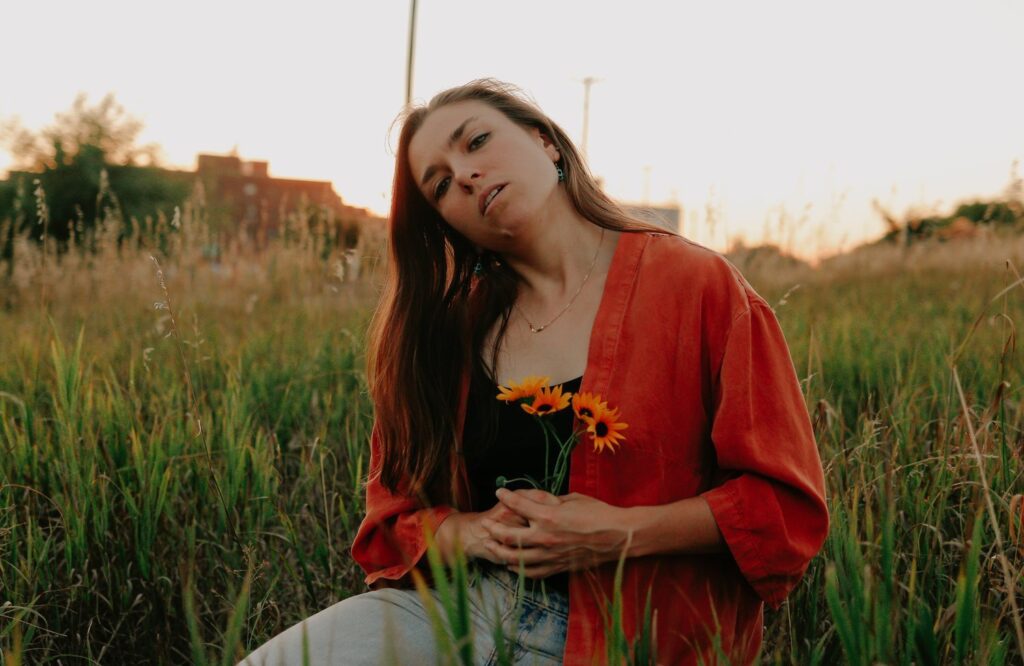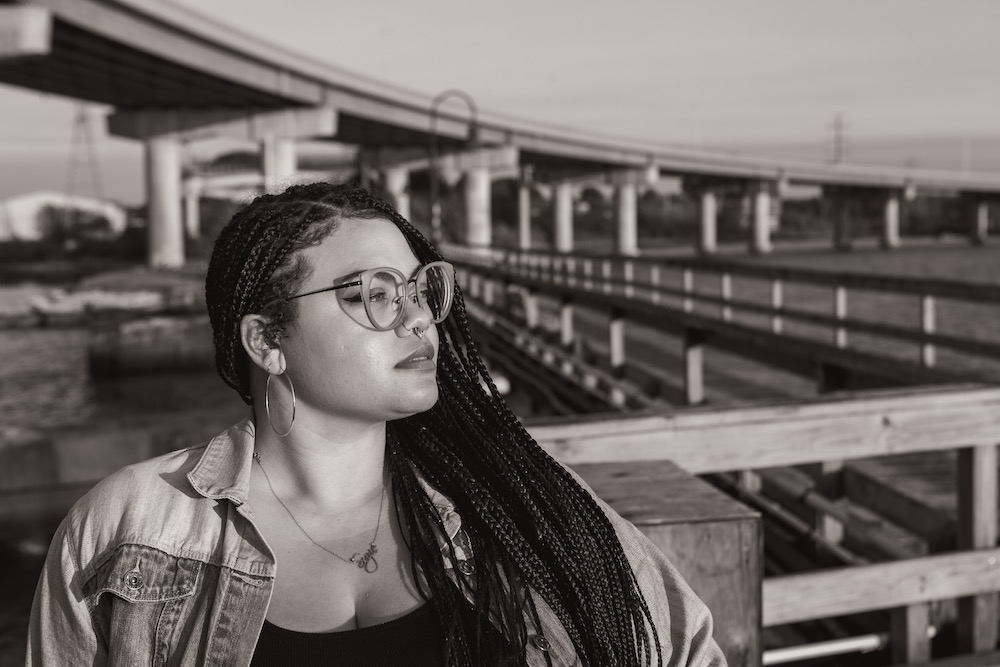Lizzie No with Eliza Edens and Suzie Assam
8:00pm
doors at 7:30pm
$18 day of show
$2 off for SPACE members
The genre-defying songwriter, harpist, and guitarist makes her Maine debut!
After a dizzying five-year span that saw the release of two stunning, eclectic albums (Hard Won and Vanity, which drew praise from the likes of Billboard and Rolling Stone) — followed by appearances at AmericanaFest, the Newport Folk Festival, Hardly Strictly Bluegrass, and SXSW, and tours with Iron and Wine, Son Little, and Adia Victoria — Lizzie No found herself at the forefront of a new vanguard of genre-defying artists. Her new album, Halfsies (Thirty Tigers / Miss Freedomland), finds No situated among her peers while still searching for freedom — freedom from the constraints of categorization, sure, but more importantly, freedom from the depths of her own personal despair and from an increasingly violent and nightmarish American cultural and political landscape.
“Some albums are stories, some are films. This album is a video game,” No says of Halfsies, which traces the journey of Miss Freedomland (a character that represents No herself and her audience), from a place of both internal and external exile to liberation. The album, No says, is meant to be immersive — these songs are to be inhabited, not just by the singer but by those who receive them.
“If you’re in these songs with me, what seems at first like a journey of self-analysis becomes a journey to get free, and get your people free, as well.” No returns to the video game analogy. “I think of the character as being chased by what I can only describe as Pac-Man ghosts of white supremacy, moving through the levels of this game.”
On Halfsies, No’s writing is beautifully intricate, the personal and the political folding into each other as naturally as the patchwork of influences that inform the album’s eleven tracks. The album begins with the chaos and disorder of what No calls “the Street Level,” where the title track and “Lagunita” reflect the frantic energy of a character, and a country, gone off the rails. From the desolation and loneliness in the chorus of voices that come whispering through the walls in “Sleeping in the Next Room,” to the roadworn rock of “Annie Oakley,” (the ancestors beckoning from “the Spirit Level”) to the sprawling mid-apocalyptic yearning and, ultimately, deliverance of “Babylon,” No’s writing throughout the record serves as a living conversation with her influences — not just musical but literary — reflecting her reverence for a host of the great voices who came before her, from Lucinda Williams to Toni Morrison, and her search for a connection between them.
“The album begins with a kind of personal and political isolation that seems impossible to break free from,” No says, “but as Miss Freedomland moves through the levels, I wanted to surround her with community, whether spiritual or corporeal.”
That sense of community reverberates throughout Halfsies as No is joined by collaborators who reflect her own musical elasticity, surrounding her guitar and harp playing with an atmosphere that underscores the album’s musical and lyrical landscapes. Members of the Grammy-winning Attaca Quartet give the title track a frenetic, inescapable tension, quelled only by No’s plaintive vocals (she’s joined on the track by Grammy-winner Allison Russell, who also lends her voice to “Mourning Dove Waltz”). Brian Dunne sings alongside No on “Lagunita,” their voices weaving together above the jagged guitar lines and four-on-the-floor beat, building towards a chorus that threatens to swallow you whole.
The exploration of the relationship between individuality and belonging that informs Halfsies likewise informs No’s work as co-host of the Basic Folk podcast, where she has interviewed artists from Ben Harper to Valerie June about their places within the lineage of those who came before them, as musicians, activists and community members. That synthesis of personal and political courses through No’s songs, her identity as a writer owing as much to her musical influences as it does to her activism (an outspoken activist and civil rights advocate, No was recently named President of the Abortion Care of Tennessee Board of Directors).
“Toni Cade Bambara said, ‘the role of the artist is to make revolution irresistible,’” No says, recalling the writer, filmmaker and activist, whose work loomed large over the writing of Halfsies. “I think about those words all the time. Make revolution irresistible.” With Halfsies, Lizzie No aims to do just that.

On Eliza Edens’ sophomore album We’ll Become the Flowers, she seeks to understand what happens after the end. Whether grappling with heartache or a loved one’s mortality, the Brooklyn-based songwriter reimagines endings not as finite events but as devotional experiences that give way to new beginnings. Edens takes inspiration from folk luminaries such as Nick Drake, Karen Dalton and Elizabeth Cotten, sowing her compositions with introspection born from her own grief. What emerges is a glowing collection of songs that serve as a map through tumult, toward hope.
Edens sings and writes with an equally tender reverie as in her 2020 debut album Time Away From Time. But where We’ll Become the Flowers diverges, is in its narrative vulnerability. Each song is bursting: with sorrow, with anger, with the miracle of existence. “I wrote this album out of emotional necessity,” Edens says. “I had just gone through a breakup. And around the same time, my mother was diagnosed with a neurodegenerative disease. I was spending a lot of my time trying to understand what it means to watch the hopeful person who raised me seem to slowly fade away before my eyes.” As the pandemic loomed, Edens turned to music: “This project was a rope I used to pull myself out of misery, to view the despair I was feeling from a different angle. It was also my escape.”
After a successful crowdfunding campaign, Edens recorded We’ll Become the Flowers during a two-week session in July 2021 in a Minneapolis attic. She worked with her trusted friends and collaborators – co-producer and bassist Pat Keen, audio engineer and guitarist Dexter Wolfe, and drummer Shane Leonard. Going into each session, they envisioned an atmosphere of experimentation which led them to reconceptualize many of Edens’ songs. “I Needed You,” for example, changed from “a glum breakup waltz” into “a song that’s feeling good about feeling bad,” Edens says, recalling Leonard’s words after he suggested changing the time signature.
In We’ll Become the Flowers, Edens’ voice rings out sweet yet sorrowful; playful yet certain; hers is a voice capable of embodying emotion in all its complexity. When Edens asks, in the record’s opener, “How do I get there?” she stretches out the last word as if to emphasize its infinite possibilities. Yet Edens never remains in the abstract; instead, she takes us along on her emotional journey, speaking honestly, intimately, and specifically about her process: “I tried to start by weeding through the trauma in my bones,” she sings in the next verse of “How.” “To rearrange the memories / Forgive and not keep score.” In “Tom and Jerry,” Edens’ songwriting becomes more whimsical. “Oh it’s getting so hard to choose / And I’m chewing on all the alternate routes,” Edens sings, using a playful rhyme with alliterative echo.
In “I Needed You,” Edens uses the repetition of her hook to convey how her feelings toward her former lover have shifted over time. The first time she sings, “I needed you,” her voice is steeped in nostalgia, romanticizing the lover’s “flannel shirt and calming words.” But the final time Edens sings, “I needed you,” her tone has shifted: she’s harsher, irreverent even – and as if in response to remembering how much she thought she needed them, she breaks into laughter. But Edens’ conviction as a songwriter comes across most clearly in “For the Song.” “And when the rage comes around,” she sings, “And every critic’s tearing up her ground / The truth becomes power.” In this last phrase, her voice is as direct and unwavering as her words.
Creating We’ll Become the Flowers started as a way for Edens to plant her grief. What took root, however, is a series of offerings. These come in the form of scenes that are both familiar yet deeply personal to Edens: singing loudly on the highway, wandering a graveyard, dancing in the wilderness, watching her mother plant flowers, wishing to create her own shine, reminding herself that the only seed worth planting is hope. Through Edens’ words, we glimpse the possibility of change, of forgiveness, of acceptance and, in numinous spurts, joy. If we see Edens’ album as a conversation—between Edens and herself and between Edens and the listener—then the conversation opens with a question that she poses in the first song, “But how do I get there?” In the album’s denouement, “Julia,” Edens returns to this question, changed, and with a final offering: “The pen is in your hand,” she reminds us. “And the key is in your certainty.”

Suzie Assam (she/her) is a Maine-based vocalist and songwriter, currently living and working in the Greater Portland area. Caught between genres, but strongly leaning toward folk, her self-described “weepy guitar songs” seek to help folks feel a little less alone.

